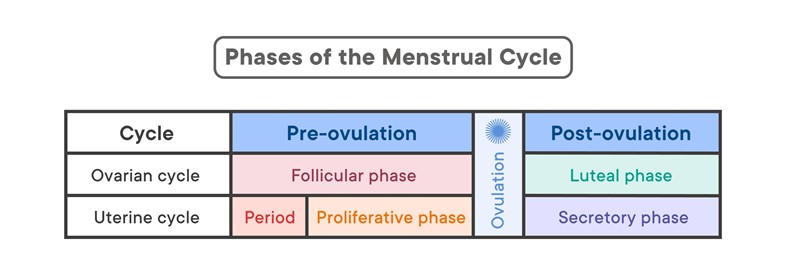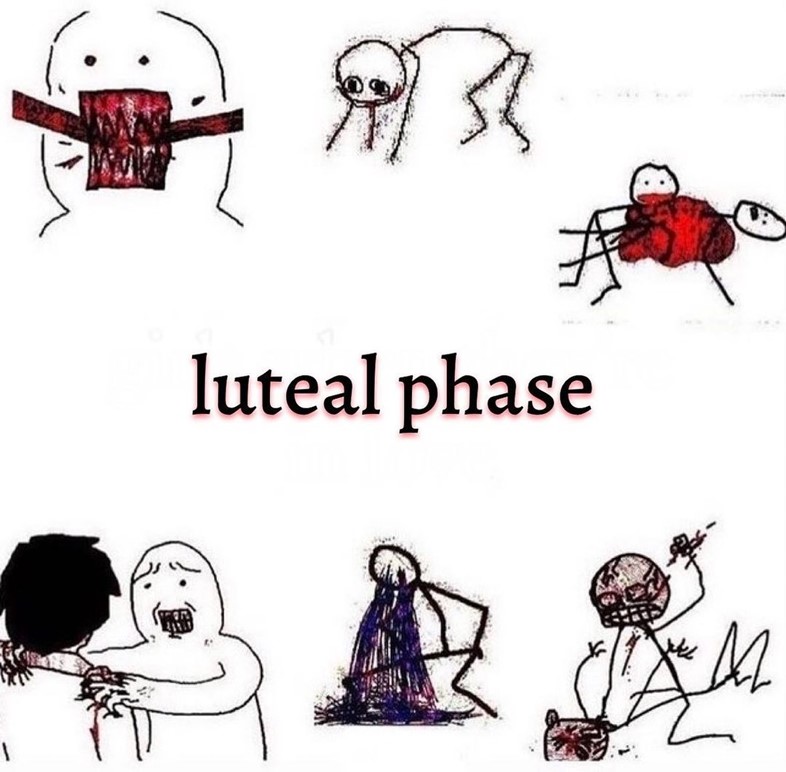According to TikTok, ‘you’re not ugly, you’re just in your luteal phase’ – but what exactly is it, and does it really have an impact on how you look and feel?
As of late, it seems there is no shortage of micro-influencers touting strange, often misinformed, wellness health advice online. When it comes to menstruation, viral trends have ranged from cycle syncing and seed cycling to menstrual face masks. Menstruation misinformation, it seems, is once again on the rise, and the latest internet fad has to do with the luteal phase. Or, according to social media, the “ugly” stage of the menstrual cycle.
Over the last several months, creators have taken to TikTok to vent about how the luteal phase is the phenomenon that turns you “suddenly into the ugliest person you have ever heard of”. On X, 28 Wellness (allegedly the #1 app to sync your period cycle) tweeted, “You’re not ugly. You’re just in your luteal phase”, to promote its menstruation tracker. Others have tweeted, “that time of the month where my face is ugly and a different shape and I’m starving but also 500 pounds known as the luteal phase,” and, “learning about the luteal phase has saved my mental health so much, because instead of looking in the mirror and being confused about why i am so ugly right now, i just look at the calender and it all makes sense.”
But what is the luteal phase, and why are people attributing being “ugly” to it? The ovarian and hormonal component of the menstrual cycle is divided into two phases: (1) the follicular and (2) the luteal stage. The follicular phase is the first half of your menstrual cycle, beginning on the first day of your period and ending in ovulation about two weeks later. The luteal phase is the second part of a cycle, and involves preparing the uterus for pregnancy by thickening the uterine lining. It ends when your next period starts.
Common symptoms of the luteal phase can include mood changes, tender breasts, bloating, breaking out and/or acne, and changes in appetite. “The luteal phase gets its name from the corpus luteum, which is the remaining egg that has not been fertilised by a sperm that is producing progesterone, preparing for a pregnancy. But when a pregnancy doesn’t happen, it shrivels up and disappears,” says Alexandra Dryer, MD of Obstetrics and Gynecology at NYU Langone Health. “Because there is that hormone fluctuation, that’s where this description of the ‘ugly phase’ of the menstrual cycle comes from – given that progesterone produces symptoms that people are sometimes unhappy with, like bloating.”
On TikTok, #lutealphase has garnered over 85.4 million views, while variations like #lutealphasehormones and #lutealphaseworkouts also have views in the millions. A lot of people, especially young women and girls, are describing the luteal phase as feeling “ugly” because of mood swings and irritability, acne flare-ups and bloating. To combat the ‘ugliness’ of the luteal phase, influencers are encouraging specific fitness regimens and diet restrictions to reduce the unpleasant symptoms. Though there is nothing wrong with getting in a good workout or eating healthier, it is a problem that the attitude behind making those lifestyle choices is due to shame and unattainable beauty standards.
“It’s a slippery slope when we start to talk about a natural and normal part of our bodies as ‘ugly’, it comes with a negative connotation,” Dr Dryer tells Dazed. A big concern is this trend causes widespread misinformation and generalisation, especially to those who suffer from menstrual-related illnesses and reproductive health conditions such as PCOS, PMDD and endometriosis (which are commonly undetected or misdiagnosed to begin with). Even for people without such conditions, menstrual cycles are variable and nonlinear, largely dependent on your environment. “Not everybody has certain symptoms with certain parts of their menstrual cycle, and no two cycles are the same,” continues Dr Dryer. For example, people with some menstrual cycle irregularities, or whose cycles are purposefully suppressed such as in some kinds of birth control, will not have a luteal phase.

“The obsession people have right now with talking about menstrual cycles is they take one little nugget of truth and then they warp it to something completely unrecognisable to what the science actually says,” says Biological Anthropologist and Professor, Kathryn B. H. Clancy, PhD of Anthropology at the University of Illinois. Her research includes misunderstandings of the menstrual cycle, published in her book, Period: The Real Story of Menstruation. While there is real lived experience behind luteal phase symptoms making a menstruating person not feel their best, Dr Clancy says the combination of the power of suggestion and confirmation bias means people are blowing symptoms out of proportion. “[These trends] take something that will feel a little real to the person watching it, like ‘yeah, sometimes right before my period I feel ugly or gross’ and then all of a sudden for two weeks every month we’re like, ‘I feel ugly,’” she says.
Ultimately, while it can be helpful to keep track of your menstrual cycle and be aware of the mood and physical effects you might be experiencing as a result, it’s important to always question who stands to gain from you feeling ‘ugly’ or upset with your body. As Dr Clancy says, “what is in it for influencers who want to push this negative symptomatology creep? What do they get out of making this claim?” Citing hyper-commodification for financial gain and fatphobia, she links this trend to body politics: “It’s connected to this broader intention of making people feel like crap so they’ll either buy your product or pay attention to you, then spiral into feeling bad.”
Deeming the luteal phase as feeling “ugly” is rooted in capitalistic commercialisation, unrealistic beauty standards and even ableism. “We all have bodies that move in and out of states of health, in and out of states of able-bodied, and in and out of states of what we consider to be the white-male norm of having a regular body. The call is always to hide and remove these [lactation, menstruation, and pregnancy] experiences as much as possible from public life,” says Dr Clancy. So, any time you see an influencer try to get you to buy a product or encourage luteal phase wellness trends, think about how that’s the real ugliness behind this fad – not your menstrual cycle.




